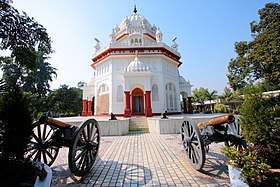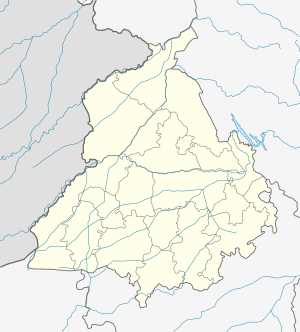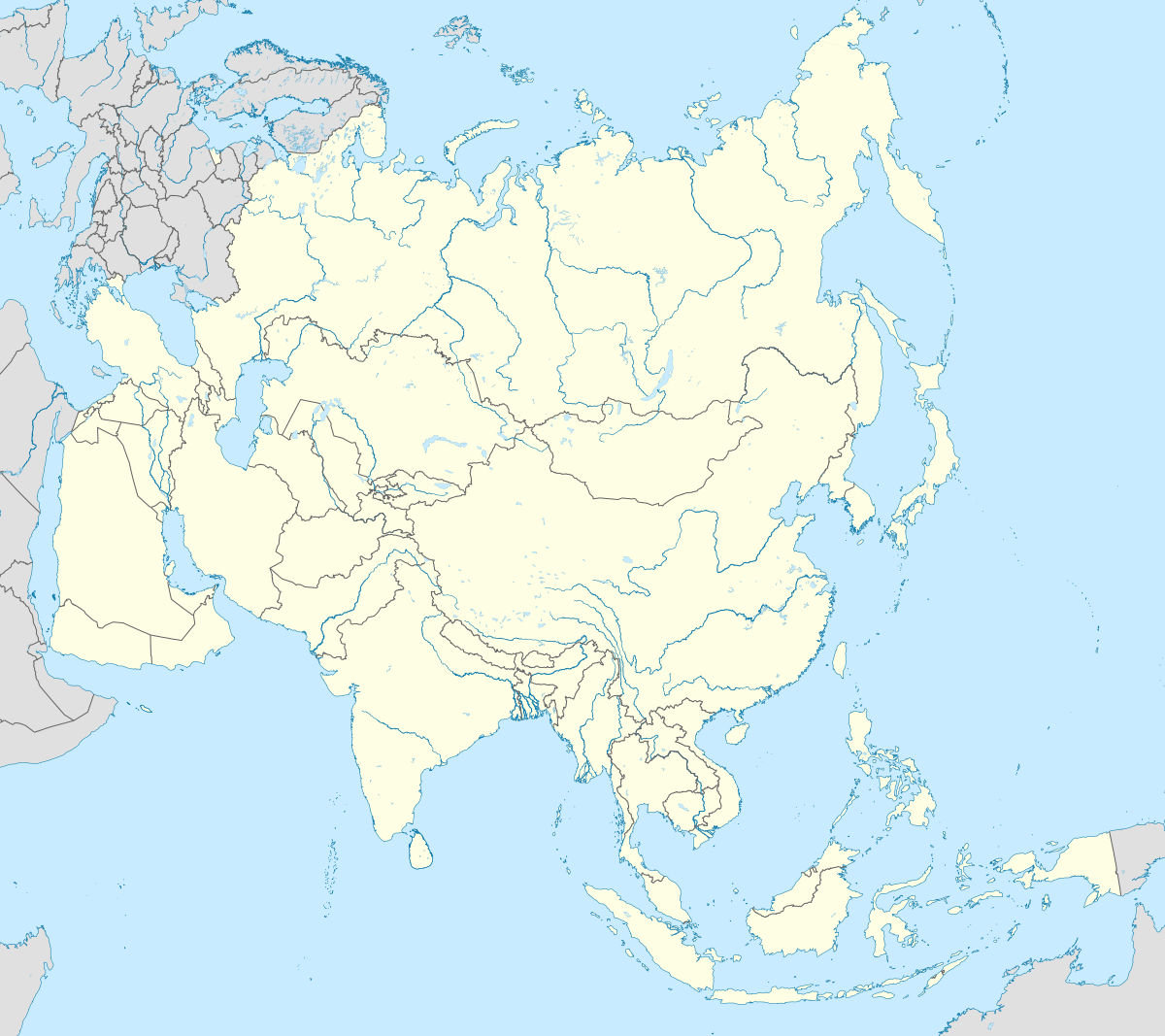Firozpur
Firozpur, also known as Ferozepur, is a city on the banks of the Sutlej River in Firozpur District, Punjab, India. It was founded by Sultan Firoz Shah Tughluq (1351–88), a ruler of the Tughluq dynasty, who reigned over the Sultanate of Delhi from 1351 to 1388.[4]
Firozpur | |
|---|---|
 Saragarhi Memorial, Ferozepur | |
 Firozpur Location in Punjab, India  Firozpur Firozpur (India)  Firozpur Firozpur (Asia) | |
| Coordinates: 30.9166°N 74.6°E | |
| Country | India |
| State | Punjab |
| District | Firozpur |
| Founded by | Firoz Shah Tughluq |
| Named for | Firoz Shah Tughluq |
| Government | |
| • Type | Democratic |
| • Member of Parliament | Sukhbir Badal (SAD) |
| • Member of the Legislative Assembly (Urban) | Parminder Singh Pinky (INC) |
| • Member of the Legislative Assembly (Rural) | Satkar Kaur (INC)[1] |
| Elevation | 182 m (597 ft) |
| Population (2011)[2] | |
| • Total | 110,313 |
| • Density | 380/km2 (1,000/sq mi) |
| Demonym(s) | Firozpuri, Firozpuria |
| Languages | |
| • Official | Punjabi[3] |
| Time zone | UTC+5:30 (IST) |
| PIN | 152001 |
| UNLOCODE | IN FIR |
| Area code(s) | 91-1632 |
| Vehicle registration | PB 05 |
| Sex ratio | 885/1000 ♂/♀ |
| Literacy | 69.80% |
| Lok Sabha constituency | Firozpur |
| Vidhan Sabha constituency | Firozpur City |
| Planning agency | PUDA |
| Major Highways | NH95 SH15 SH 20 |
| Climate | Cw (Köppen) |
| Avg. summer temperature | 29.7 °C (85.5 °F) |
| Avg. winter temperature | 16.9 °C (62.4 °F) |
| Precipitation | 731.6 millimetres (28.80 in) |
| Website | www |
After the Partition of India in 1947, it became a border town on the Indo-Pakistani border with memorials of India's freedom fighters.[5]
History
The city of Firozpur is located on the banks of the Sutlej river on the Indo-Pakistan border. It was founded by Firoz Shah Tughlaq in the 14th century. The town is a major cantonment of the country. The town is located in 10 gates. The Saragarhi Memorial Gurudwara commemorates 21 Sikh soldiers of the 36th Sikh Regiment. The soldiers died while protecting the Fort Saragarhi in Waziristan on 12 September 1897.[6]
The Barki Memorial was constructed in 1969 to perpetuate the memory of the soldiers of the 7 Infantry Division who died in battle in 1965 and paved the way for the fall of Barki a town situated at a distance of 15 miles south-east of Lahore.[7]
Climate
| Climate data for Firozpur | |||||||||||||
|---|---|---|---|---|---|---|---|---|---|---|---|---|---|
| Month | Jan | Feb | Mar | Apr | May | Jun | Jul | Aug | Sep | Oct | Nov | Dec | Year |
| Average high °C (°F) | 19 (66) |
21 (69) |
26 (78) |
34 (94) |
38 (101) |
39 (103) |
34 (94) |
33 (91) |
33 (92) |
32 (89) |
26 (79) |
21 (69) |
30 (85) |
| Average low °C (°F) | 7 (44) |
8 (47) |
13 (55) |
18 (65) |
23 (73) |
26 (79) |
26 (79) |
24 (76) |
23 (74) |
17 (63) |
11 (52) |
7 (45) |
17 (63) |
| Average precipitation mm (inches) | 20 (0.80) |
38 (1.50) |
30 (1.20) |
20 (0.80) |
20 (0.80) |
61 (2.40) |
229 (9.00) |
188 (7.40) |
86 (3.40) |
5.1 (0.20) |
13 (0.50) |
20 (0.80) |
730.1 (28.8) |
| Source: [8] | |||||||||||||
Demographics
As of 2011 Indian Census, Firozpur had a total population of 110,313, of which 58,451 were males and 51,862 were females. Population within the age group of 0 to 6 years was 11,684. The total number of literates in Firozpur was 78,040, which constituted 70.7% of the population with male literacy of 73.3% and female literacy of 67.9%. The effective literacy rate (population of 7 years and above) was 79.1%, of which male literacy rate was 82.3% and female literacy rate was 75.6%. The Scheduled Caste population was 27,395. Firozpur had 22263 households in 2011.[2]
According to the 2001 Indian census[9] Firozpur had a population of 95,451, which increased from 78,738 in 1991. Males constitute 53 per cent of the population and females 47 per cent. It had an average literacy rate of 71 per cent, higher than the national average of 59.5 per cent: male literacy was 73 per cent and female literacy 68 per cent. 11 per cent of the population was under 6 years of age.
Religion
According to the 2011 census, Hinduism and Sikhism are the main religions of Firozpur. Minorities are Christianity, Islam, Buddhism and Jainism.[10]
Media
Firozpur has an All India Radio Relay station known as Akashvani Firozpur. It broadcasts on 100.1 MHz frequency.
Notable people
- Susham Bedi, author
- George Bigge, cricketer
- Alexander Cadell, cricketer
- Sohraab Dhaliwal, cricketer
- Horatio Dumbleton, cricketer
- Sher Singh Ghubaya, politician
- Annie Gill, actress
- Zora Singh Maan, politician
- Verma Malik, lyricist
- Charles Kindersley, cricketer
- Narain Chand Parashar, politician
- Bano Qudsia, writer
- Ganda Singh, revolutionary
- Janmeja Singh Sekhon, politician
- Ronjan Sodhi, shooter
Notes
- "Assembly elections 2017: Only 6 women legislators make entry into Punjab Assembly". Hindustan Times. Retrieved 31 January 2018.
- "Census of India: Firozpur". censusindia.gov.in. Retrieved 2 January 2020.
- "52nd REPORT OF THE COMMISSIONER FOR LINGUISTIC MINORITIES IN INDIA" (PDF). Nclm.nic.in. Ministry of Minority Affairs. p. 32. Archived from the original (PDF) on 25 May 2017. Retrieved 30 August 2019.
- Sen, Sailendra (2013). A Textbook of Medieval Indian History. Primus Books. p. 98. ISBN 978-9-38060-734-4.
- "Firozpur". Info Punjab. Retrieved 14 October 2006.
- "Welcome to the official website of District Ferozepur, Punjab, India". Ferozepur.nic.in. Retrieved 31 January 2018.
- "Welcome to the official website of District Ferozepur, Punjab, India". Ferozepur.nic.in. 11 September 1969. Retrieved 31 January 2018.
- "Average Weather for Firozpur - Temperature and Precipitation". The Weather Channel. Retrieved 25 February 2008.
- "Census of India 2001: Data from the 2001 Census, including cities, villages and towns (Provisional)". Census Commission of India. Archived from the original on 16 June 2004. Retrieved 1 November 2008.
- "C-1 Population By Religious Community - Firozpur City". census.gov.in. Retrieved 1 January 2020.
External links
- . Encyclopedia Americana. 1920.
- Official website